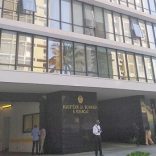Mozambique wants border posts with Zambia and Zimbabwe under public-private concession
ADIN: ‘There will be no exclusions in the application of funds’

File photo: DW Africa
Four years after its creation, ADIN is finally moving forward with concrete projects. The chairman of ADIN details how €21 million will be used to support small and medium-sized companies in northern Mozambique.
Almost four years after the creation of the Agency for Integrated Development of the North (ADIN), some of its projects are beginning to materialise. Mozambique now has €21 million allocated by partners such as the World Bank and UNDP, to develop economic and social initiatives and to support local micro, small and medium-sized companies in the provinces of Nampula, Cabo Delgado and Niassa.
These investments aim to solve the problems of the population, especially the victims of armed attacks in Cabo Delgado since 2017.
ADIN was officially launched on August 31, 2020 by President Filipe Nyusi, with the aim of reducing regional asymmetries and promoting the development of the northern provinces.
In an interview with DW, ADIN chairman Jacinto Loureiro explained how the €21 million will be used. The amount will be applied immediately on several fronts, aiming both at economic development and at mitigating the effects of the conflict in the region. Loureiro guarantees that there will be no exclusions.
DW Africa: How will the €21 million be used?
Jacinto Loureiro (JL): This amount will be applied immediately to several projects, not only focusing on the conflict, but also on development. This is a project financed by the World Bank, especially for the northern region. It has several components, and of these US$23 million (€21 million), a significant part will be allocated to investment in micro and small businesses. The goal is to create almost 10,000 companies, of which 500 will receive funding to establish themselves more solidly. This investment will be targeted primarily at local entrepreneurs.
DW Africa: What are the criteria for selecting companies?
JL: There is currently a team responsible for training and selecting the companies that will benefit most from the fund. Companies are already being invited to apply. During the training, we will improve the selection method, identifying those that have the greatest potential to receive funding.

DW Africa: And will young entrepreneurs be covered by this project? Will those who work alone benefit from ADIN funds?
JL: Yesterday we had the opportunity to meet a young entrepreneur in Nampula who produces content for television. We were impressed and invited him to register. We noticed that some young people are still unaware of the program, so if you can help spread the word among young entrepreneurs, it would be very helpful.
DW Africa: Are measures in place to prevent the exclusion of local young people, as has been much discussed recently?
JL: Of course. We take every opportunity to publicise these programs. Yesterday was another day of publicity, and a week ago I met with journalists from Pemba to ask that these programs be widely publicised, to prevent exclusion. We use newspapers, radio and other media to ensure that the information reaches everyone. Publicity is intense.
DW Africa: And in the province of Cabo Delgado, specifically? Is there a priority district or region for the start of this project?
JL: We have teams on the ground in Cabo Delgado. We are currently offering training to several companies that have already registered and also training trainers to expand our reach. Our goal is to reach around 10,000 small businesses.
DW Africa: Several students from Cabo Delgado were sent to Portugal for technical training, through a partnership between the government, ADIN, the Scholarship Institute and the World Bank. How are these young people integrating into the province?
JL: The integration is happening in the best possible way. One factor that will help these young people is the stage in life that the training provides. Each one will seek their own job opportunity. In the current program, we have a window to pay part of the salary of these young people during a paid internship. We want to ensure that these young graduates are not abandoned and can enter companies.
Although we cannot force companies to hire them, our goal is for companies to see the value in keeping them. We will offer a salary for six months so that companies will accept them as interns. Often, companies end up absorbing these young people at the end of the internship.












Leave a Reply
Be the First to Comment!
You must be logged in to post a comment.
You must be logged in to post a comment.